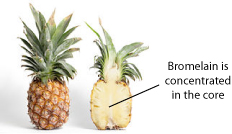

| Visitors Now: | |
| Total Visits: | |
| Total Stories: |

| Story Views | |
| Now: | |
| Last Hour: | |
| Last 24 Hours: | |
| Total: | |
Plant Power: Bromelain is a Protein-Digesting Pineapple Enzyme That Has Been Found to be Superior to the Highly Toxic Anti-Tumour Chemo Agent 5-Fluorouracil
There is a well-known effect associated with a wide range of natural compounds called “selective cytotoxicity,” whereby they are able to induce programmed cell death (the graceful self-disassembly known as apoptosis) within cancer cells, while leaving healthy cells and tissue unharmed. No FDA-approved chemotherapy drug on the market today has this indispensable property (because chemicals don’t have behave like natural compounds), which is why cancer treatment is still in the dark ages, often destroying the quality of life, and accelerating the death of those who undergo it, often unwittingly. When a person dies following conventional cancer treatment it is all too easy to “blame the victim” and simply write that patient’s cancer off as “chemo-resistant,” or “exceptionally aggressive,” when in fact the non-selective nature of the chemotoxic agent is what ultimately lead to their death.
 Every once in a while a study pops up on the National Library of Medicine’s bibliographic database (MEDLINE) that not only confirms the therapeutic relevance of natural substances in cancer treatment, but blows the conventional approach out of the water. Published in 2007 in the journal Planta Medica, researchers found that an enzyme extracted from pineapple stems known as bromelain was superior to the chemo-agent 5-fluorauracil in treating cancer in the animal model. The researchers stated:
Every once in a while a study pops up on the National Library of Medicine’s bibliographic database (MEDLINE) that not only confirms the therapeutic relevance of natural substances in cancer treatment, but blows the conventional approach out of the water. Published in 2007 in the journal Planta Medica, researchers found that an enzyme extracted from pineapple stems known as bromelain was superior to the chemo-agent 5-fluorauracil in treating cancer in the animal model. The researchers stated:
“This antitumoral effect [bromelain] was superior to that of 5-FU [5-fluorouracil], whose survival index was approximately 263 %, relative to the untreated control.”
What is so remarkable about this research is that 5-FU has been used as a cancer treatment for nearly 40 years, and has been relatively unsuccessful due to its less than perfect selectivity at killing cancer, often killing and/or irreversibly damaging healthy cells and tissue, as well.
As a highly toxic, fluoride-bound form of the nucleic acid uracil, a normal component of RNA, the drug is supposed to work by tricking more rapidly dividing cells — which include both cancer and healthy intestinal, hair follicle, and immune cells — into taking it up, thereby inhibiting (read: poisoning) RNA replication enzymes and RNA synthesis.
material safety data sheet (MSDS) for 5-FU


